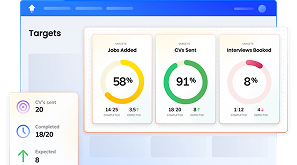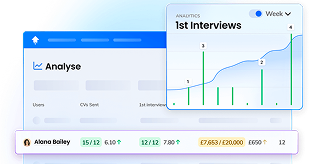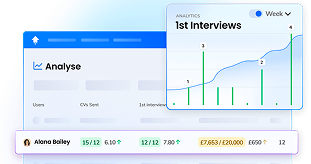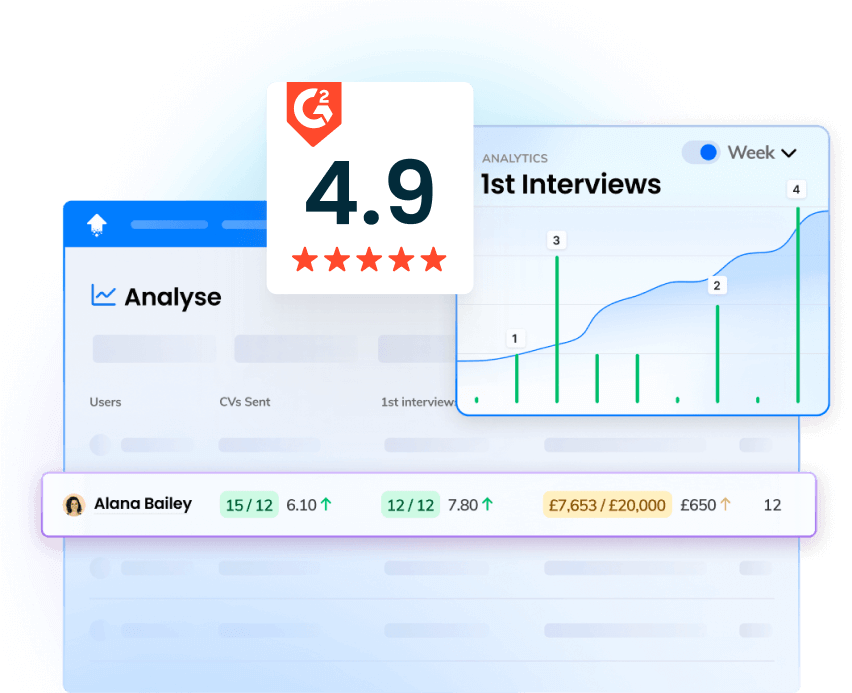The rising cost of living. Increased business borrowing costs. An ongoing shortage of talent.
It’s safe to say 2024 served up plenty of challenges for recruitment agencies to navigate.
Despite this, agency leaders remain upbeat, with 92% describing themselves as either “optimistic” or “very optimistic” about their prospects for the year ahead.
And they’ll need to maintain a positive mindset, because there are plenty more speed bumps on the horizon. For example, the global talent shortage is projected to reach 85.2 million by 2030, making sourcing top candidates more difficult than ever.
At the same time, 67% of talent acquisition professionals anticipate AI-driven hiring will reshape recruitment in 2025, forcing agencies to adapt.
As the old saying goes: “Forewarned is forearmed.”
With that in mind, we’ve analysed the business landscape to bring you the 20 biggest recruitment challenges agencies will face in 2025.
Let’s get into it…
20 Key Recruiting Agency Challenges for Agencies
Challenges faced by recruitment agencies in 2024 range from age-old problems to new issues prompted by recent developments and trends.
Whatever the case, you need to know about all of them if you’re going to thrive in tricky market conditions over the coming year.
1. Understanding Rep and Team Performance
Getting an accurate view of how your team and individual recruiters are performing is difficult. An applicant tracking system (ATS) can significantly aid in managing team performance by providing detailed insights and streamlining processes.
Given the tough market conditions (see next section), it’s more essential than ever for agencies to build an efficient recruitment funnel — but you can’t do that without the necessary performance data.
Fortunately, OneUp is here to help.
Our recruiting analytics software empowers agency team leaders to track and report on real-time data through beautiful, intuitive dashboard visualisations.

That way, they can dig under the bonnet to find out what’s really going on across all the metrics that matter most to your agency.
👉 Learn more: Recruiter Performance Review: From Template to Action
2. Motivating Your Team in a Down Market
Keeping recruitment teams motivated during a buoyant market is simple: jobs keep rushing in, qualified candidates are open to opportunities, and everyone’s earning a ton of commission.
Things get harder in more challenging market conditions — like those we faced in 2024 — because you can’t just throw money at the issue. An efficient recruitment process can help keep the team motivated by reducing administrative burdens and allowing them to focus on more rewarding tasks.
In fact, it’s one of the biggest challenges faced by recruiters right now.
You need to find efficient, scalable ways to keep your reps hungry — and OneUp has the solution.
Our software offers a suite of tools purpose-built for helping you foster healthy competition on your team:
- Display real-time leaderboards so reps can compare performance against their colleagues.
- Create individual or team-level competitions to challenge your reps.
- Celebrate success as a team, including setting your own celebration anthems.

👉 Learn more: Top 19 Gamification Recruitment Tools to Use in 2024
3. Setting Measurable and SMART Recruitment Goals
Next up is a challenge that’s far from new, but is arguably more relevant than ever as clients place agency performance and value for money under ever-greater scrutiny. Hiring software can play a crucial role in setting and tracking these goals effectively.
To continue meeting client expectations, it’s vital that agencies drive efficiencies throughout the recruitment process.
And to do that effectively, you must set measurable, meaningful goals and track performance against them.
For best results, make your goals SMART:
- Specific: What, exactly, are you tracking?
- Measurable: Can you track how you’re performing?
- Attainable: Is this goal realistically achievable?
- Relevant: Will achieving this goal actually help your agency?
- Time-based: When are you aiming to achieve it by?
An example is: “Increase first interviews booked by 5% quarter-on-quarter by the end of Q2.”
👉 Learn more: 9 SMART Goals for Recruiters and How to Track Them
4. Aligning Recruitment Marketing with a Strong Employer Brand
Research consistently shows that the way candidates perceive employers is one of the most important factors in attracting talent.

All of which means it’s no longer enough for recruitment agencies to promise candidates decent pay, benefits, and career progression opportunities — they also need to sell candidates on the employer brand.
Make employer branding a key element of your recruitment marketing efforts in 2025 by:
- Communicating the employer’s mission, vision, and values
- Spelling out their company culture and benefits clearly and succinctly
- Highlighting their policies around remote and/or hybrid working
- Explaining what issues the employer cares about (like DEI or sustainability)
- Sharing stories from happy current and former employees
5. Utilising Social Media to Connect With Candidates
With 61 million people using LinkedIn to search for job ads each week, social media should already play a key role in your recruitment efforts.
Still, the fact remains that most social media users aren’t actively looking for a new career opportunity.
And let’s be honest: most agencies don’t want their recruiters spending hours a day trawling LinkedIn — or any other social platform, for that matter — in the hopes of stumbling across the right candidate.
That’s why social media remains a top recruitment challenge in 2025.
Fortunately, there’s a ready-made solution: LinkedIn automation.
Building automated messaging sequences helps recruiters with reaching and engaging qualified candidates at scale.
6. Simplifying Application Processes
Back in the days of Windows XP, candidates might have put up with a clunky application process.
But not today.
Over two-thirds of candidates dropped out of their most recent recruitment experience, or considered doing so, largely because of these three reasons:
- The process was taking too long
- It was too complicated
- There were too many touchpoints
This is one of the toughest hiring challenges for recruitment agencies, because you don’t have full control over the application process.
Still, it’s in your best interests to streamline the process through slick communication and effective expectation management.
7. Implementing Efficient Referral Programs
Four in five organisations believe employee referrals are their most cost-effective source of talent.
But referrals aren’t just for hiring teams — your recruiters have their own networks packed full of potential candidates who’d love to be considered for your latest hard-to-fill vacancy.
Used effectively, referrals can slash your time to hire (while also reducing cost per hire), making your whole recruitment process more efficient.
And a faster, more efficient recruiting process inevitably translates to happier clients.
For agencies, the biggest recruitment difficulties around referrals are about building those all-important talent networks: it could take a bunch of time and effort before you see a return.
8. Personalising Candidate Communication
Once upon a time, recruiters could get away with boilerplate candidate communication.
But expectations have changed dramatically.
Today, quality candidates want to feel like recruiters are taking the time to speak to them as individuals, not just another CV to review.
That’s especially true of younger candidates, with 95 percent of Gen Z-ers saying they’re more likely to engage with a job opportunity if the recruiter takes a proactive, personalised approach.
Personalisation is impossible to achieve at scale through manual effort alone, so you’ll have to invest in personalisation software if you want to overcome one of this year’s biggest challenges in hiring.
9. Coordinating With Hiring Managers
Want to know candidates’ biggest frustration when it comes to working with recruitment agencies:
A lack of response to applications.

Slow response times are often caused by poor coordination between recruiters and hiring managers, so improving these relationships should be one of the biggest challenges in recruitment you aim to tackle in 2025.
At the very least, ensure recruiters are always meeting with hiring managers at the start of a project to confirm that everyone’s on the same page.
10. Streamlining Reference and Background Check Processes
In the UK, the average time to hire now stands at around 36 days.
Most agencies, hiring managers, and candidates would say that’s too long.
A lot of this time stems from employers taking too long to interview candidates.
But agencies can play their part in tackling one of the most common recruiting challenges by streamlining the reference and background check process.
Technology can remove the need for endless emails and phone calls by automatically sharing reference questionnaires at exactly the right time.
Automated reference checks also ensure a standardised experience, which makes it easier to compare responses.
11. Providing Comprehensive Candidate Information
No candidate wants to feel unprepared at any stage of the hiring process.
But with 53 percent of candidates saying they’ve abandoned a recruitment process because of poor communication, it’s a fair bet that many feel they haven’t been given all the information they need to thrive in their application.

While that information ultimately has to come from the client, it’s up to recruitment agencies to gather it in the first place and share it with candidates.
This challenge of recruitment should be easy to solve.
Your recruiters know what candidates want — they just need to ensure all the necessary information is in place before job postings go live.
12. Combating Unconscious Bias
It’s no secret that unconscious bias is a big issue throughout the hiring process.
Many recruitment agencies and HR teams have invested in training and education to mitigate the effects — because, after all, they just want to find the best candidates, regardless of who those candidates are and where they come from.
Still, there’s plenty of evidence to suggest that unconscious bias remains one of the biggest challenges of a recruiter.
Just one in 10 unconscious bias training programmes provided practical strategies for attendees to reduce bias, with 87 percent of participants saying their firms’ training is mostly about:
- Explaining the science behind bias
- Discussing the costs of discrimination
Neither of which is going to eradicate the problem.
👉 Learn more: Read Harvard Business School’s research on unconscious bias (plus strategies to combat it effectively).
13. Effective Candidate Assessments and Assignments
One of the top recruiting challenges in any year is the need to balance skill evaluation with candidate convenience.
Treat it too lightly and you’ll end up bombarding clients with a succession of under-qualified applicants. But if you go the other way, you risk putting off top talent before they’ve even reached the first interview.
Both outcomes are equally bad. However, there’s some good news, because it turns out the majority of candidates are in favour of skills-based assessments as part of the hiring process.

It’s all about using those assessments at the right time.
Consider testing soft skills earlier in the recruitment process. Then, if necessary, follow up with a hard skills assessment once you’ve narrowed the talent pool.
14. Assessing Remote Work Readiness
With UK workers spending less time in the office than any other country apart from Canada, it’s fair to say many of us are familiar with working from home.
But that doesn’t necessarily mean we all like it.
According to the latest YouGov figures, 29 percent of Brits want to work from home all the time, whereas 43 percent would prefer to do so some of the time.
Significantly, 21 percent say they’d prefer to never work from home.

As such, one of the biggest current recruitment challenges is about finding candidates who aren’t just comfortable with WFH, but are able to produce their best work while doing so.
15. Leveraging Data-Driven Recruitment
Data-driven recruitment is an opportunity, enabling you to make smarter, more efficient decisions on the candidates you source and how you help them progress through the hiring process.
But it’s also one of your biggest challenges as a recruiter — because if you don’t leverage data effectively, you’ll fall behind agencies that do.
The trouble is that most data analysis tools aren’t fit for purpose.
They’re either totally manual (i.e. spreadsheets), totally outdated (think recruitment CRMs), or far too complex for non-specificalists (like Power BI and Tableau).
Which is why so many agencies are switching to OneUp’s recruitment analytics platform, which lets you:
- Gather real-time performance data from multiple places into a single platform
- Choose any metric and visualise performance by day, week, month, quarter, or year
- Build custom dashboards so individual recruiters can easily access the metrics that matter

If only everything was that simple.
👉 Learn more: From Outreach to Onboarding: 17 Recruiting KPIs to Track
16. Building and Sustaining a Strong Agency Brand
We’ve already spoken about how agencies need to incorporate employer brand in their marketing to candidates.
But it’s becoming increasingly important for agencies themselves to build a strong brand that:
- Appeals to the right types of clients
- Helps them attract top talent
Traditionally, if you asked agency owners “what are the main challenges in recruitment?”, few would mention branding.
That outlook needs to change if you’re going to thrive in 2025 and beyond. With so many other agencies out there, and so little top talent, you need to give candidates a compelling reason to deal with you.
17. Ensuring a Memorable Candidate Experience
Every recruitment agency strives to deliver a candidate experience that’s memorable for the right reasons.
But research suggests many are falling short, with candidate resentment — a measure of how negatively job seekers rate their candidate experiences — rising globally in recent years.
As challenges of recruitment and selection go, this is a big one: if your agency gets a reputation for delivering poor candidate experiences, job-seekers will be reluctant to deal with you.
Potential solutions include:
- Building a closer connection with candidates through video and in-person conversations
- Clearly communicating the employer’s branding and value proposition
- Sharing useful information with candidates, such as tips on how to ace the interview process
- Ensuring prompt communication with candidates at each stage of the hiring process
- Offering constructive, actionable feedback when asked.
18. Balancing Speed and Quality in Candidate Selection
Speed and quality are a constant balancing act for recruitment agencies.
On one hand, you want to vet CVs and get first interviews booked as quickly as possible. But on the other, you want clients to be delighted with the quality of candidates you put forward.
It’s always been a tough ask — and it’s a whole lot tougher given the current market conditions and widespread talent shortages.
There are no easy solutions here.
Rather, it’s about reducing time to hire by optimising your recruitment process, while managing client expectations through clear and transparent communication.
👉 Learn more: What is a Recruitment Report? Everything you Need to Know
19. Managing High-Volume Applicant Flows
High-volume recruiting challenges are familiar to many agencies, especially those trying to fill junior-level or blue-collar vacancies.
Traditionally, in these scenarios, it’s been all too easy to neglect candidate experience and quality.
But in the age of automation, there’s no longer an excuse for letting standards slip.
Build automated responses to send to every candidate once they apply for a role, letting them know that you’ve received their application and setting out the next steps in the process.
And don’t forget to follow up — manually, if necessary — to communicate delays and decisions.
20. Navigating Legal and Compliance Issues
Complying with employment laws and regulations should always be a key focus for recruitment agencies.
Failing to do so could lead to expensive financial penalties, not to mention substantial damage to your agency’s reputation.
Sure, keeping up to date with the latest legislation — from anti-discrimination laws to data privacy regulations — can feel like navigating a minefield.
But there are various tech solutions you can use to automate some of these complex measures, such as performing compliant candidate background checks.
Overcoming Recruitment Challenges With OneUp
By this point, you’re probably wondering how to overcome recruitment challenges as significant and wide-ranging as those in our roundup.
While there’s clearly no silver bullet, many can be overcome — or at least mitigated — through a combination of smarter data usage and more effective recruiter motivation.
Both of which can be achieved using OneUp.
Our performance management, motivation, and reporting solutions are the closest thing to a silver bullet in this challenging business climate.
Automate the reporting process to get all the key figures delivered when you need them, with zero manual effort. Leverage real-time data and stunning dashboard visualisations. And keep your recruiting team focused on the targets that really matter.
Sounds good, right?



















